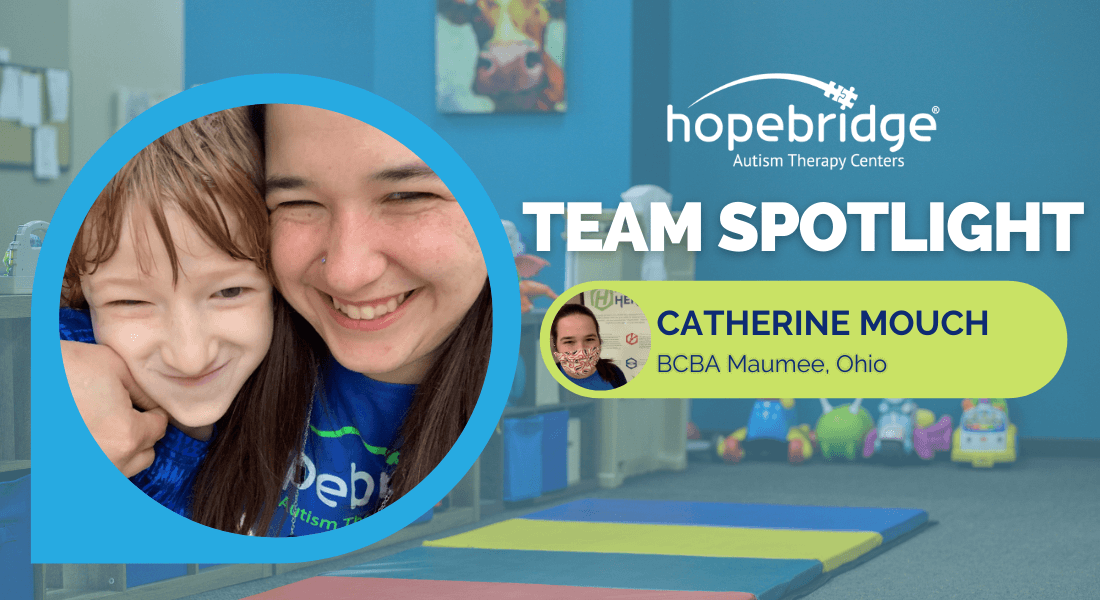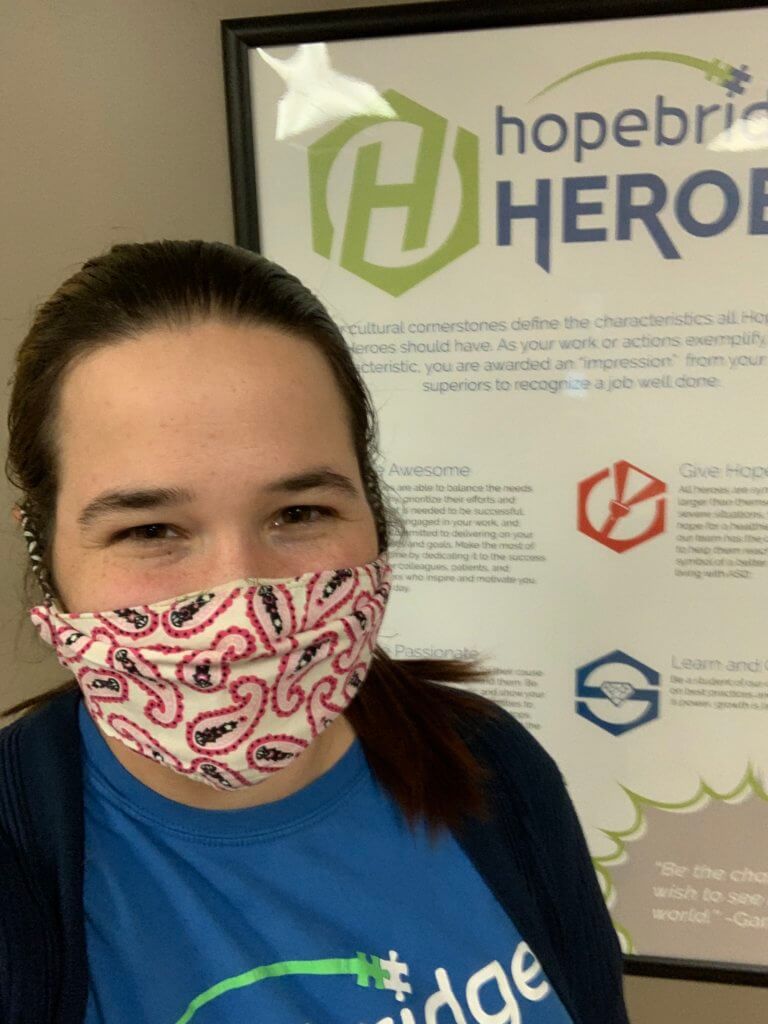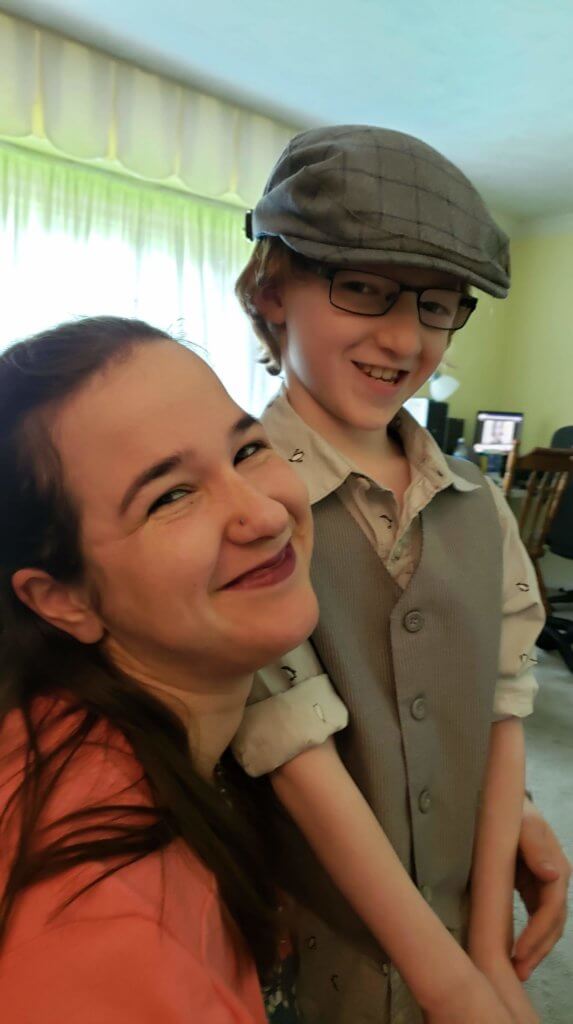How a Passion for Caring for Kids Turned into a Career for Hopebridge BCBA Catherine Mouch
December 08, 2020
December 08, 2020

Did you ever think your childhood and teenage experiences could help prepare you for your future career? Though Catherine Mouch may not have completely understood what she wanted to be when she “grew up,” the roles she took on in her earlier years set her up for success, both at work and at home.
Now, as a board certified behavior analyst (BCBA) at the Hopebridge Autism Therapy Center in Maumee, Ohio, Catherine continues to build upon her background through continuing education opportunities to help all of her kiddos – including her step-son – thrive in their own lives.

Setting the Stage for a Budding Behavior Analyst
Catherine’s passion for serving others started with her younger sister, who at 11 years her junior, she thought of as her own baby. She took such great care of her sibling and other kids that she was able to fund one of her trips to study abroad with her babysitting money! In addition, while she was in high school, her aunt opened an art studio for adults with special needs. Catherine was first in line to volunteer, which fueled her desire to work in the disability realm.
With the desire to dedicate her life to others, she started in a premedical program in college, but soon learned it was not for her. While trying out a few other majors to discover the right path, a parent from one of the families she babysat suggested she work at her school during the summer. This mom was a BCBA at a school that based its program around applied behavior analysis, which is where Catherine got her first taste of ABA therapy. The job introduced her to methods and tools like Discrete Trial Training (DTT) and the Picture Exchange Communications System (PECS), which sparked her interest and shifted her toward gaining a master’s degree in behavior analysis.
Catherine told us that before she came to Hopebridge, it took her a while to obtain her supervision hours to become a BCBA. Following graduation, it was important to her to continue updating her knowledge base, so she took the time to listen to ABA podcasts, attend workshops and do a ton of self-teaching.
Her education did not stop at passing the BCBA exam. A few months later, she began her role at Hopebridge, where she was really able to put her knowledge to work.
“I love that Hopebridge is willing to invest in training its people. There are systems in place that are built to support BCBAs, everything from avenues to gain and give feedback on RBTs, to how to submit documents for our clients’ insurance,” said Catherine. “I appreciate the support in this role even more because I was not a BCBA before this job. The training and continuing education opportunities allow me to keep up with my learning and provide the best possible care.”
As part of her continued education, Catherine has spent time learning about precision teaching and putting it into action. The data-driven, evidence-based practice can be used as part of ABA to incorporate time into trials. By pushing herself to grow her knowledge and implementing precision teaching, she feels it not only gives her more ownership over her kiddos’ progress, but the children also like it because they are able to grasp their own progress.
“My grad program barely mentioned precision teaching. I asked my supervisor if we could practice it and was told, ‘we don’t really do it here,’” said Catherine. “Alternatively, Hopebridge gave me the freedom and support to implement new programs for kids who may not be responding to other methods. No one here says there is only one correct way to do something.”
For instance, Catherine worked with one child who had been in ABA therapy and occupational therapy for more than a year, but would still give the therapist his hands as a request to prompt him to do something. Catherine began applying precision teaching methods with him that included fine motor and matching skills.
After a couple of months, he can now stack Legos, put train tracks together, pull his zipper up and down 200 times per minute, and put on his socks … and he giggles while he’s doing it! Independent play has been a big win for them, since he no longer waits for an adult to tell him when or how to play. He also recently counted out loud to 10, ending with “I’m all done,” which is a win. Catherine is happy to see the resulting progress, knowing their hard work is coming to fruition.
Catherine’s commitment to her work and never-ending education has also come in handy at home. Her step-son, Liam, was diagnosed with high-functioning autism spectrum disorder (ASD), attention-deficit/hyperactivity disorder (ADHD) and significant dyslexia early this year.
Liam is almost 11 years old and is currently homeschooled, though they tried sending him to school in January. At home, his mom had tried several different homeschool reading programs, but he was not able to read beyond the words, “I,” “and” and his own name. He could memorize certain reading programs, but had trouble getting through them again on the next occasion. The psychologist who performed his diagnostic evaluation said he would likely always need someone to read and scribe for him.

“I didn’t accept that. I came home and went on YouTube to learn everything I could about precision teaching and Fit Learning to help him and then tried to copy it,” said Catherine.
She started with a few sight words and some reversals, then put them in a list and tested to see how fast he could do it. They also worked on motor skills like squeezing spray bottles and turning door knobs to build function for writing.
Liam gained two and a half grade levels in less than six months and his comprehension is at grade level! He is now reading Harry Potter books for fun, so their work paid off at school and for entertainment at home.
“Autism only means the individual relates to the world a little differently than the majority. It’s such a broad range that it is almost not useful to talk about as a whole,” said Catherine. “My kiddo, Liam, is never going to be any less than anyone else. We just have to get away from the cookie cutter and be a little more creative and flexible with him.”
Do you want to change lives and advance your own learning through your career? View the open positions across the United States on the Hopebridge job site to get started in a role where you can care for children while continuing to thrive in your own success.
*Informed consent was obtained from the participants in this article. This information should not be captured and reused without express permission from Hopebridge, LLC. Testimonials are solicited as part of an open casting call process for testimonials from former client caregivers. Hopebridge does not permit clinical employees to solicit or use testimonials about therapeutic services received from current clients (Ethics Code for Behavior Analysts 5.07-5.08; BACB, 2020). Hopebridge does not provide any incentives, compensation, or renumeration for testimonials provided by a former client or client caregiver.